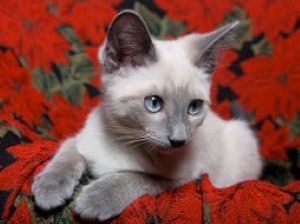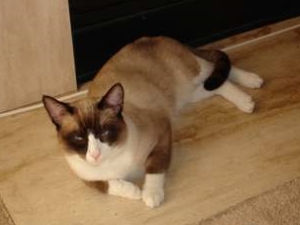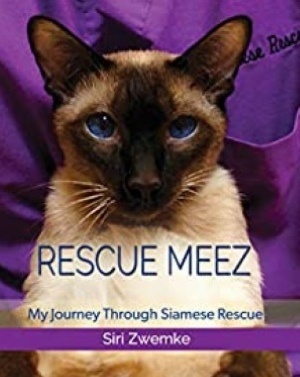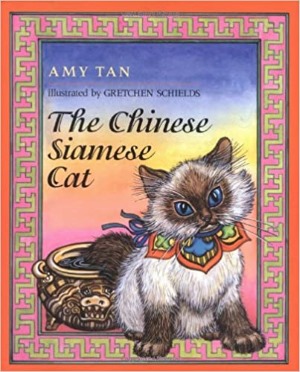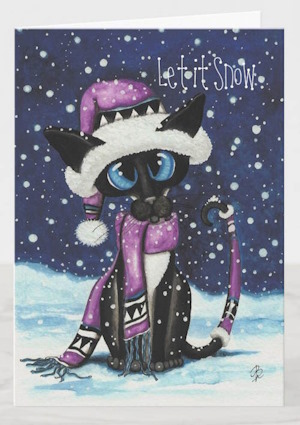- Home
- Meezer Musings
- July 2023
Meezer Musings: July 2023
What Should I Feed My Cat?
Welcome to July's Meezer Musings!
"What should I feed my cat?". I recently received this question from a website visitor. I haven't written much about this over the years, first, because I'm not an expert in feline nutrition and second, because it's a huge topic, often fraught with controversy.
It stimulates much debate even among experts, and those of you
who've owned Siamese cats for years will long ago have decided for yourselves what
best to feed your own cats.
However, there's no doubt that paying attention to your cats' diet and providing them with the right foods is vitally important to their health and energy, giving them the best chance of living a long and healthy life.
So, for those of you who are new to cats, and/or Siamese cats, (and with the proviso that I'm still not an expert!) you'll find some general guidelines below.
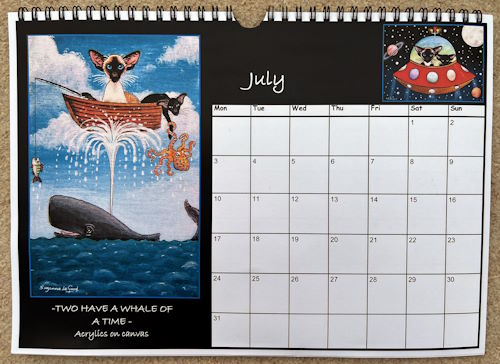 "Two Have a Whale of a Time", from Suzanne Le Good's Siamese Cat Art Calendar 2023
"Two Have a Whale of a Time", from Suzanne Le Good's Siamese Cat Art Calendar 2023The delightful image above is this month's page from Suzanne Le Good's 2023 Siamese Cat Art Calendar and shows a pair of her delightful characters, the 'Two' - a seal point Siamese cat and his little Oriental pal - enjoying a spot of fishing for their suppers, aided and abetted by a friendly passing whale.
I thought this was particularly appropriate for our July topic, as there's no doubt that cats enjoy the taste of fish. Bandit would appear instantly, seemingly out of nowhere, whenever I opened a can of tuna or sardines, and many other Siamese cats would do the same!
However, while it's fine as an occasional treat, cats can't live solely on tinned fish (especially tuna - here's a vet-written article that explains why).
It's important to understand some basic feline nutritional requirements so we're going to take a look at these first, followed by some thoughts on feeding at different life stages, and ending with a brief look at considerations for some specific health conditions.
General Nutritional Principles for Feeding Cats
1. Cats Are Obligate Carnivores
"Cats are obligate carnivores". What does this mean? It means that cats' bodies are designed to thrive on a diet consisting first and foremost of animal protein - they must eat meat because meat contains various nutrients they can't get any other way.
The most important of these is taurine, an amino acid constituent of protein that's only available from meat, and, to a lesser extent, fish.
Taurine is extremely important for heart, brain, eye, and nerve health. Human bodies can manufacture taurine out of a different amino acid, but cats cannot do this.
Other essential nutrients are arachidonic acid (a type of fat found in muscle meats and liver) and vitamin A, which is also found in animal tissues.
When buying cat food, look for foods that list a named meat source like beef, chicken,
turkey, or fish, as the first ingredient. Check that the label says "complete" and "balanced" to ensure that all the important nutrients are included.
2. Cats Have a Low Thirst Drive
Our domestic cats evolved, over thousands of years, from desert-dwelling ancestors and today's cats still carry some of the traits that allowed them to survive in these harsh landscapes.
One of these, the ability to get most of the fluids they need from their prey, means that cats have a low thirst drive so it's essential to make sure they stay hydrated. Wet cat foods (or a combination of wet and dry foods) can help to increase their water intake and it's best to avoid an entirely dry diet unless this has been specifically recommended by your vet.
Cats in the wild drink from streams and waterholes, often well away from where they kill their prey. Some domestic cats also prefer to eat and drink in different locations. Experiment by keeping food and water bowls separate and have several water bowls located in different rooms in the house.
3. Cats Don't Need Fillers and Additives
Food labeling in most countries requires that ingredients are listed in order of quantity, which is why the first ingredient in any list should be meat or fish.
Cats have no dietary need for fillers and artificial additives. These are often included in cheaper cat foods to bulk them out. Choose foods that are low in corn, wheat, and soy, and ideally free from artificial colors, flavors, and preservatives.
Vegetable fillers like corn, wheat and soy should appear (if at all) towards the end of a list of ingredients, not near the beginning.
Feeding for Life Stages
It's important to be aware that as cats grow and mature, hopefully into old age, their nutritional needs change so they need different types of foods at different life stages.
The notes below give a brief outline of each life stage and the points to watch for.
Kitten (0-12 Months)
Unless you happen to rescue a very tiny kitten, most kittens will be weaned and eating solid foods by the time they move to their 'forever' homes.
Kittens need specially formulated foods containing higher levels of protein, fat, vitamins, and minerals, to help with their growth and development so choose foods specifically labeled as kitten food and "complete and balanced" to ensure your kittens gets all the necessary nutrients they need.
Cats are officially kittens until the age of one year old, and should eat specially-formulated kitten food until their first birthday.
Adult (1-7 Years)
At one year old, your cat reaches adulthood and you can transition to an adult cat food. Look for options that provide a balanced blend of protein, fats, and carbohydrates to maintain their optimal weight and overall health.
Senior (7+ Years)
A cat of 7 years + is officially a senior cat. From this age, cats may begin to develop a number of different health conditions and it's particularly important to liaise with your vet, who can provide tailored dietary recommendations based on your cat's individual needs and medical history.
Senior cat food formulas are designed to support an older cat's changing needs, including weight management, allergies, urinary tract health and kidney function.
The notes below are just a starting point.
Dietary Considerations for Specific Health Conditions
- Weight management: If your cat is overweight, your vet can help formulate an appropriate weight-loss plan. Your cat may need a weight management cat food that is lower in calories (to help with weight loss) and
higher in fiber (to help to keep them feeling full and satisfied).
- Allergies
or food sensitivities: For cats with food allergies or
sensitivities, vets may suggest an elimination diet or a
hypoallergenic cat food that avoids common allergens, such as beef,
dairy, or grains.
- Urinary tract health: Cats
can be prone to urinary tract issues, including urinary crystals or
stones. A cat food formulated for urinary tract health can help maintain
proper pH levels and reduce the risk of these problems. These diets are
usually low in magnesium and promote increased water consumption.
- Kidney disease: Cats with kidney disease need a specialized diet that helps reduce the workload on the kidneys. These diets are typically lower in protein, phosphorus, and sodium, and they may contain added omega-3 fatty acids to support kidney function.
Choosing the right cat food is essential and understanding your cat's specific life stage and any existing health conditions can help you make wise choices about their diet.
The priorities are:
- high-quality animal protein
- essential nutrients
- hydration, ideally from food
By following these guidelines and seeking help from your vet when needed, you can ensure that your cat receives the nutrition they need to live a happy and healthy life.
Tail End ...
That's all from me for July and I hope it's been helpful, although I realize that this only scratches the surface of the subject. Perhaps I'll return to this in more depth in the future!
For now though, for personal reasons, I'll be taking a break for a few months but Meezer Musings will be back in the autumn, and until then, wherever you are, I wish you and your cats a very happy, healthy time.
Caroline
Missed a Meezer Musings? A list of previous newsletters can be found here.
Some of the articles and newsletters on this site may contain links to products I think you may enjoy. If
you purchase through these links I receive a small commission, but there's
no extra cost to you. Find out more on the Affiliates Disclosure page.
Have You Discovered Our Newsletter?
If not, why not? Subscribe to our email newsletter, Meezer Musings, to stay in touch, be the first to see new information and pages as they come out, and read the things we only talk about in the newsletter.
Learn more about it on our Newsletter Sign-Up page.
